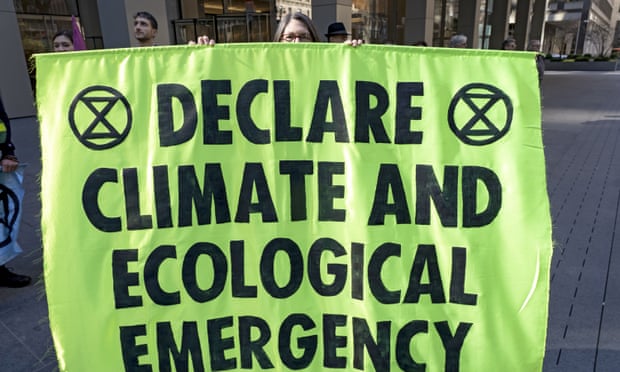Fossil fuels kill more people than Covid. Why are we so blind to the harms of oil and gas?
The Guardian
Were we able to perceive afresh the sheer scale of fossil fuel impact we might be horrified, but because this is an old problem too many don’t see it as a problem.
(Text continues underneath the photo.)

A climate activist holds banner in front of the NYC office of JPMorgan Chase bank's new headquarters during an ‘Occupy Park Avenue’ protest on 29 October 2022 in New York City. Photograph: Ron Adar/Rex/Shutterstock.
If fossil fuel use and impact had suddenly appeared overnight, their catastrophic poisonousness and destructiveness would be obvious. But they have so incrementally become part of everyday life nearly everywhere on Earth that those impacts are largely accepted or ignored (that they’ve also corroded our politics helps this lack of alarm). This has real consequences for the climate crisis. Were we able to perceive afresh the sheer scale of fossil fuel impact we might be horrified. But because this is an old problem too many don’t see it as a problem. (...)
[L]ong-term phenomena become acceptable merely because of our capacity to adjust. Violence against women (the leading form of violence worldwide) and slower forms of environmental destruction have been going on so long that they’re easy to overlook and hard to get people to regard as a crisis. (...)
To normalize is to turn something into the status quo, into something no longer seen as a problem, and this in turn undermines the impetus to pursue a solution. (...)
The fossil fuel industry through airborne particulate matter alone annually kills far more people every year than Covid-19 has in three years. Recent studies conclude that nearly 9 million people a year die from inhaling these particulates produced by burning fossil fuel. It’s only one of the many ways fossil fuel is deadly, from black lung among coal miners and cancer and respiratory problems among those near refineries to fatalities from climate-driven catastrophes such as wildfire, extreme heat and floods. (...)
One consequence of these habits of mind is the hostile reaction to the impact of renewables. Renewables require mining; the total amount of mining they require is far less than the fossil-fuel mining that goes on all around us and has for a long time. (...)
With renewables the materials need to be extracted once and then are used for many years and are thereafter, in many cases, recyclable; with fossil fuel we burn it up as we go, so constant new interjections of coal, oil or gas are needed. They literally go up in smoke. (...)
“Avoiding climate breakdown will require cathedral thinking. We must lay the foundation while we may not know exactly how to build the ceiling.” (...)
Astroturf organizations backed by conservatives and fossil-fuel interests have pushed false claims about health threats and organized locals against both wind turbines and solar installations. But the space they take up can be far less than that occupied by fossil fuel, and many turbines and solar panels coexist with agriculture. (...)
The way we have long operated was always destructive, and it’s now a crisis larger than any in human history. Change needs to come, swiftly, and though practical change is crucial, so are changes in imagination, perception and values. The two go together, and they always have.
Tags: #fossil_fuel #oil #gas #exxonmobil #suncor #tar_sands #pollution #air_pollution #health #climate #climate_change #climate_crisis #renewables #energy #energy_transition
There are no comments yet.